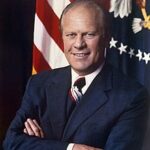The Nixon Pardon Decision
On September 8, 1974, President Gerald Ford made one of the most controversial decisions in American history. Ford granted Richard Nixon a full presidential pardon for all crimes committed during his presidency. This Nixon pardon came just one month after Ford took office. The decision shocked the nation and ended any possibility of criminal prosecution. ⚖️
The Watergate Context
Nixon had resigned on August 9, 1974, facing near-certain impeachment over Watergate. The scandal involved illegal surveillance, cover-ups, and abuse of presidential power. Criminal investigations were ongoing when Ford issued the Nixon pardon. Special prosecutors had been building cases against the former president. Ford’s decision effectively terminated all legal proceedings.
Immediate Public Reaction
The Nixon pardon triggered massive public outcry across America. Approval ratings for Ford plummeted from 71% to 50% within days. 📉 Critics accused Ford of making a secret deal with Nixon. Many Americans felt justice had been denied. Ford insisted he acted to heal the nation and move forward. 🤝
Impact:
Political Consequences for Ford
The Nixon pardon became Ford’s political albatross throughout his presidency. His approval ratings never fully recovered from the initial collapse. The decision haunted Ford during the 1976 presidential campaign against Jimmy Carter. Democrats constantly reminded voters about the controversial pardon. Ford lost the election by a narrow margin, with many analysts citing the Nixon pardon as the decisive factor. 📉
Constitutional and Legal Precedent
Ford’s decision established important precedents about presidential pardon power. Legal scholars debated whether presidents could pardon successors preemptively. The Nixon pardon raised questions about accountability for high-level government officials. It demonstrated the broad scope of executive clemency authority. Future presidents would reference this precedent in controversial pardon decisions. ⚖️
Long-term Democratic Trust
The pardon deepened American cynicism about government transparency and justice. Public trust in presidential decision-making declined significantly after 1974. Many citizens believed powerful politicians operated above the law. The decision reinforced perceptions of Washington insider deals. This erosion of trust contributed to decades of political skepticism. 🔥
